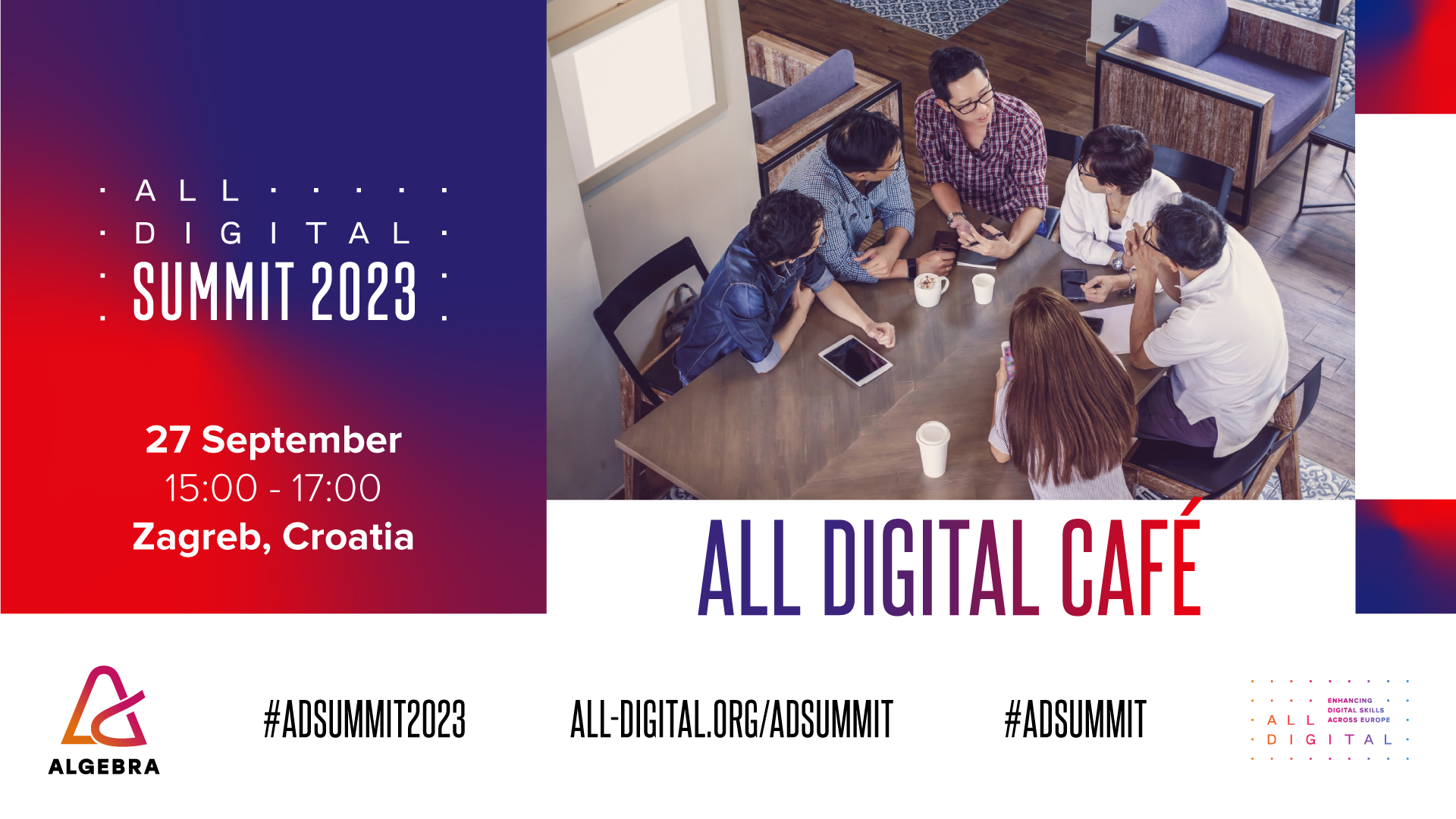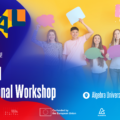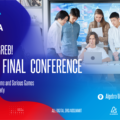
15 Sep ALL DIGITAL CAFÉ
15 Sep, 2023
ALL DIGITAL CAFÉ
Concept
The ALL DIGITAL Café session is a participatory get-together to discuss the latest ideas on different fields of digital education.
The first part will be dedicated to the introductory session where four Board members will present the 4 scheduled sessions. They will explain the scope of the engaging conversation that they will lead in the second part of the gathering.
The second part will consist on a one hour discussion between members of ALL DIGITAL, stakeholders and experts in the digital skills and inclusion field, led by our 4 Board members: Achilles Kameas, Hellenic Open University, Marianna Marcucci, Invasioni Digitali and Europeana Network Association, Nenja Wolbers, Stiftung Digitale Chancen, David Domínguez, Fundación Esplai. They will cover respectively digital innovation, digital transformation for audience engagement in cultural heritage, digital equality, and digital transformation in non-profits.
The goal of each discussion is to generate ideas useful to draft and submit new European projects involving the ALL DIGITAL members, potential new members, and partner organisations. Participation to each session is voluntary, however, we would privilege the idea of clustering participants on the basis of topic interest and area of expertise, as this would allow to have to have more focused roundtables and fruitful discussions.
Topics and Rooms
Room Faust Vrančić
Digital Equality
Is digital equality (or digital equity) still defensible in light of the climate crisis? Digital equality is essential for a well-functioning society, as digital technology plays an increasingly important role in our lives. Digital equality refers to equal access and use of digital technologies and resources for all people, regardless of their social, economic or cultural background. Digital equality goes hand in hand with the expansion of broadband infrastructure, barrier-free design of new end devices, the implementation of projects and initiatives. All these measures consume more and ever, more resources and pollute the environment.
With rising sea levels and fires all over Europe, is it still justifiable to expand and further develop digital tools and server services, and all this in the name of social prosperity? And if so, how can we think both together? If no, what are the consequences? Let’s discuss together on a European and global scale!
The theme will be presented by Nenja Wolbers, Stiftung Digitale Chancen.
Digital Transformation in non-profits
“Paradigm change in social intervention, digital Transformation in non-profits, new sector professionals’ profiles and roles. Processes for the social entity’s digital transformation, changes in the organizational culture.”
The theme will be presented by David Domínguez, Fundacion Esplai
Room Nikola Tesla
Digital Transformation for Audience engagement in Cultural Heritage
Digital transformation is a key priority for cultural heritage institutions today. By digitizing their collections, they can increase their visibility and reach new audiences around the world but, equally important, they can use digital technologies to engage with users in new and innovative ways.
However, it is important for cultural heritage institutions to remember that their role is not just to reach a global audience. They also have a responsibility to connect with their local communities. In the post-COVID-19 era, this is more important than ever: user-driven storytelling, co-creation, crowdsourcing, and citizen participation are just some examples of creating content that is relevant to the local community.
By using digital technologies to connect with their local communities, cultural heritage institutions can play a vital role in building a more resilient and inclusive society.
The theme will be presented by Marianna Marcucci, Invasioni Digitali and Europeana Network Association.
Digital Social Innovation
According to the quintuple helix model, innovation is a process that involves five different mechanisms: Education, State, Industry, Public & Environment. For this process to yield results that would really improve society, all contributing factors must participate, collaborate and interplay. Of special importance is social innovation, that is, innovation that results from members of the society itself, who can participate with anu of the above roles. The recent digital transformation of society that equipped most of its members with basic digital skills and the proliferation of new digital technologies that broaden the horizon of what’s possible can prove the catalysts for a new wave of digital social innovation. Education and training will again be the power engine to achieve this goal via capacity building of involved actors, but also collaboration and citizen engagement are expected to play a major role. This round table will respond to a call for action that will lead to the development of innovative projects to achieve digital social innovation via the Erasmus+ programme.
The theme will be presented by Achilles Kameas, Professor, Hellenic Open University










